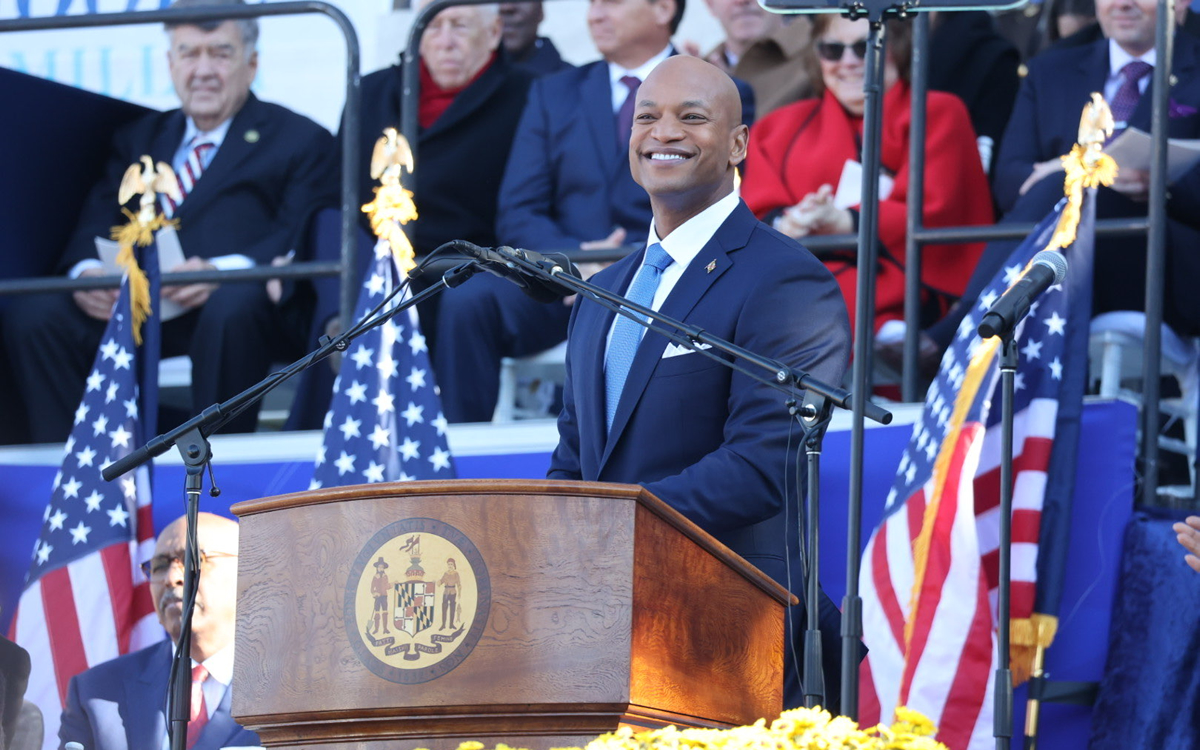Local
Maryland to take up marriage, trans bills
Lawmakers return next week; supporters plan Feb. lobbying events


Maryland Gov. Martin O’Malley announced plans last year to include a same-sex marriage bill as part of his administration’s legislative package in 2012. (Washington Blade file photo by Michael Key)
Bills calling for legalizing same-sex marriage and banning discrimination against transgender persons are among the hot-button issues set to emerge next week when the Maryland State Legislature begins its 2012 session.
Officials with an expanded coalition backing the marriage bill and a new transgender advocacy group leading the effort on behalf of the Gender Identity Non-Discrimination Act say they are hopeful that the legislature will pass both measures before it adjourns for the year in April.
“It’s all hands on deck with both bills,” said Carrie Evans, executive director of the statewide LGBT group Equality Maryland. “We’re talking to many lawmakers, including Republicans.”
Evans and others working on the two bills were cautious about predicting when leaders of the Maryland Senate and House of Delegates will bring the measures up for a vote, saying control over the timing of the bills was exclusively in the hands of the lawmakers.
Supporters were also cautious about disclosing strategy for defeating an expected voter referendum that experts say will almost certainly be brought before the electorate in November – in the midst of the U.S. presidential election – if the Maryland Legislature passes a marriage bill this spring.
Public opinion polls show voters in the state are evenly divided over whether to vote for or against same-sex marriage.
Under rules of the Maryland Legislature, the committees with jurisdiction over the bills must hold a public hearing on the marriage and gender identity bills, even though the two bills were the subject of lengthy and contentious hearings less than a year ago during the legislature’s 2011 session.
The Democratic-controlled Senate approved the marriage bill last March in what supporters called an historic 25-21 vote. But the Democratic-controlled House of Delegates killed the measure for the year by voting to send it back to committee after supporters determined they were a few votes short of the 71 votes needed to pass it in the 141-member House.
In what some called an ironic twist, the House of Delegates passed the transgender bill last year before the Senate killed it by voting to send it back to a Senate committee. Senate President Thomas V. Mike Miller (D-Prince George’s and Calvert Counties) reportedly orchestrated the decision to hold off on a Senate vote, saying a number of key supporters changed their minds and threatened to vote against the bill.
Shortly after the defeat of the marriage bill last year, supporters led by the Human Rights Campaign formed Marylanders for Marriage Equality, an expanded coalition of organizations with a track record of political clout with state lawmakers. Among the coalition partners are the NAACP of Baltimore, the Maryland ACLU, and the Service Employees International Union (SEIU). The National Gay and Lesbian Task Force, Equality Maryland and HRC are also members of the coalition.
Coalition spokesperson Kevin Nix of HRC has said each coalition partner brings unique skills and expertise to the lobbying effort on behalf of the marriage bill.
But coalition officials haven’t disclosed which, if any, lawmakers who were uncommitted or against the bill last year have indicated support this time around.
“The good news and the bad news is the legislators are the same,” said Mark McLaurin, a gay man who serves as political director for the Local 500 of the SEIU of Maryland.
He noted that having the same players is helpful to a degree because they are already informed on the marriage and transgender bills. But McLaurin cautioned that with no election taking place since the 2011 legislative session, it may be hard to line up the additional supporters needed to pass the bills.
“Quite frankly, despite the great work that’s been done since the last session, I haven’t heard very many announced conversions from no to yes,” he said. “So in many respects I feel we’re in the same place that we were.”
Like others lobbying for the marriage bill, McLaurin said he is hopeful that Gov. Martin O’Malley’s decision to include the marriage and transgender bills as part of his legislative package this year will provide an important boost for both measures.
McLaurin, a former board member of Equality Maryland, criticized LGBT advocates and supportive lawmakers last year for their decision to withdraw the marriage bill from the House rather than bring it up for a vote. He said a vote would have helped in the lobbying efforts this year by identifying for certain where lawmakers stand on the marriage measure.
Other supporters disagree with that view, saying a vote last year would have forced wavering House members to take a position, possibly against the bill, making it more difficult for them to vote for it this year without being labeled as “flip-floppers.”
Veteran transgender advocate Dana Beyer, executive director of Gender Rights Maryland, the newly formed statewide group, said a number of important developments since the transgender bill died in the legislature last year have given the bill “great momentum” this year.
Among the developments are O’Malley’s strong endorsement of the bill and his pledge to make it one of his legislative priorities, said Beyer. She noted that O’Malley responded, in part, to the flurry of publicity surrounding the beating of transgender woman Chrissy Lee Polis at a McDonald’s restaurant outside Baltimore in April. The beating, which was captured on video taken by a McDonald’s employee, created a national sensation and boosted support in Maryland for transgender non-discrimination legislation.
In two other developments, the Howard County, Md., legislature passed a gender identity non-discrimination bill in December and the Eleventh Circuit U.S. Court of Appeals ruled that same month that a transgender woman fired from her job in Georgia was protected from discrimination by the U.S. Constitution’s equal protection clause barring gender-related discrimination.
“All of these things are giving this bill tremendous momentum,” Beyer said. “I feel really good about where things stand.”
Opposition to the marriage bill, coordinated last year by the National Organization for Marriage, is being spearheaded this year by the Maryland Marriage Alliance, a state coalition with ties to NOM.
“Special interest groups are pressuring politicians in Annapolis to redefine marriage in Maryland – despite the strong opposition of a majority of Maryland citizens,” the group says on its website. “A large outcry throughout the state convinced our elected officials last year to reject this drastic action, but the threat is raising its head again,” the web message says.
The group is calling on Marylanders to send contributions to support its effort to oppose the marriage equality bill and to “protect” marriage as a union of “one man and one woman.”
It has announced plans for a rally against the bill in Annapolis early this year and is encouraging churches to call on their congregations to oppose the bill on a regular basis during Sunday sermons.
Supporters of the marriage bill say the approval of a similar bill by the New York Legislature last year, under the strong leadership of New York’s Democratic governor, Andrew Cuomo, would also help the effort in Maryland.
Leaders of Marylanders for Marriage Equality, including HRC officials involved with the coalition, have yet to disclose their views on possible changes in the wording of the Maryland bill. But speculation has surfaced that O’Malley and supportive lawmakers in the legislature might follow Cuomo’s decision to add a new provision to expand the bill’s exemption for religious organizations.
Cuomo reportedly persuaded some wavering lawmakers to support the New York marriage bill by agreeing to add a provision that allows religious organizations other than churches, including some businesses, to refuse to rent their facilities or provide services, such as catering or the sale of wedding gowns, for same-sex marriages.
Gay rights groups that had been opposed to such exemptions went along with Cuomo’s backing of the exemptions.
When asked about a possible broadening of the religious exemption provision of the Maryland marriage bill, Nix, the spokesperson for Marylanders for Marriage Equality, said only, “Governor O’Malley is committed to ensuring that religious institutions are protected under Maryland law.”
Equality Maryland, meanwhile, announced this week a series of events and activities it will sponsor to push for the marriage bill. Among them are nightly phone banks staffed by volunteers across the state; a Feb. 1 prayer breakfast and Clergy Lobby Day in Annapolis; and a Feb. 13 lobby day in Annapolis in which LGBT advocates from across the state will visit their representatives to urge support for the marriage bill.
“Equality Maryland will also work with Gender Rights Maryland to pass a bill that will add protections in existing anti-discrimination laws for transgender individuals,” according to a statement issued this week by Equality Maryland.
District of Columbia
Weekend brings two shootings in U Street, Dupont Circle areas
Man dies after incident at Desperados

A man was shot to death shortly after 1 a.m. on Saturday, April 27, inside the Desperados Burgers & Bar at 1342 U St., N.W., which is located on the same block a short distance away from the LGBTQ nightclub Bunker D.C. and around the corner less than a block away from the recently opened LGBTQ bar Crush on 14th Street, N.W.
The incident prompted Bunker to post on its Facebook page a message saying its security team quickly ushered patrons standing outside to enter the club and as a precautionary measure prevented patrons from leaving until it was deemed safe to do so.
A D.C. police statement identifies the shooting victim as Kenneth Goins, 43, of Salisbury, Md. The statement says officers on patrol in the 1300 block of U Street, N.W. heard gunshots at about 1:12 a.m. and immediately arrived at Desperados to investigate the incident.
“Officers located a man inside with multiple gunshot wounds,” the statement says. “Despite all life saving efforts, the victim was pronounced dead on the scene,” it says. Neither the statement nor a police incident report pertaining to the shooting provides a description of the person who committed the shooting nor discloses whether any of the customers inside the restaurant and bar witnessed the shooting.
The statement says the police Homicide Branch is investigating the shooting and urges anyone with knowledge of the incident to call police at 202-272-9099. Like all homicide cases, it says the D.C. Metropolitan Police Department offers a reward of up to $25,000 to anyone who provides information that leads to the arrest and conviction of the person or persons responsible for a homicide committed in the District.
“There was a shooting incident on U ST. N.W., just 4 doors down from BUNKER,” the Bunker Facebook post says. “Our security team promptly responded, ensuring the safety of everyone by ushering them inside for cover,” it says. “Currently, the courageous police officers are outside, handling the situation and working diligently to maintain a secure environment for our guests,” the message continues.
“As a responsible establishment, we strongly prioritize your safety, and as a precautionary measure, we will not permit anyone to exit the building until we deem it safe to do so,” the posting says. “Rest assured, we, as the owners, take this matter very seriously, and your safety remains our highest priority.”
The U Street shooting at Desperados Burgers & Bar took place a little over two hours after six people were shot and wounded outside the Decades nightclub at 1219 Connecticut Ave., N.W. near Dupont Circle and near several gay bars on P Street and 17th Street in the Dupont Circle area. Police said none of those who were shot suffered life-threatening injuries
A separate police statement says with the help of several witnesses, police identified and arrested Rennwel Mantock, 29, of Hyattsville, Md., in connection with the shooting on charges of Assault with Intent to Kill, Possession of Unregistered Ammunition, and Possession of an Unregistered Firearm. The statement says a gun belonging to Mantock was recovered on the scene. Court records show a judge has ordered him to be held without bond until a May 7 preliminary hearing.
“The detectives’ investigation determined Mantock opened fire after employees removed him from a nightclub following a dispute,” according to the statement.
A police arrest affidavit filed in D.C. Superior Court says Mantock told police at the time he was apprehended on the scene that he was dancing with a woman at the club when a security guard ordered him to leave and then “grabbed him by the neck and punched him in the face right before dragging him down the steps.” The Decades club states on its website that it has several floors with multiple bars.
According to the arrest affidavit, Mantock told police that one of the security officials punched him in the face again and threw him to the ground after dragging him out the door. It says Mantock “stated that he then pulled out his gun and started shooting” because “he was very upset about the security punching him in the face,” adding that he “began firing at the Decades’ security.”
The affidavit says five of the six people shot were Decades employees.
Gay former Dupont Circle Advisory Neighborhood Commissioner Mike Silverstein, who lives near where the shooting took place, said Decades is not known as a place that LGBTQ people patronize but said the surrounding neighborhood is home to many LGBTQ residents and draws many LGBTQ visitors.

Maryland Gov. Wes Moore on Thursday signed a bill that seeks to combat efforts to ban books from state libraries.
House Bill 785, also known as the Freedom to Read Act, would establish a state policy “that local school systems operate their school library media programs consistent with certain standards; requiring each local school system to develop a policy and procedures to review objections to materials in a school library media program; prohibiting a county board of education from dismissing, demoting, suspending, disciplining, reassigning, transferring, or otherwise retaliating against certain school library media program personnel for performing their job duties consistent with certain standards.”
Moore on Thursday also signed House Bill 1386, which GLSEN notes will “develop guidelines for an anti-bias training program for school employees.”
District of Columbia
Catching up with the asexuals and aromantics of D.C.
Exploring identity and finding community

There was enough commotion in the sky at the Blossom Kite Festival that bees might have been pollinating the Washington Monument. I despaired of quickly finding the Asexuals and Aromantics of the Mid-Atlantic—I couldn’t make out a single asexual flag among the kites up above. I thought to myself that if it had been the Homosexuals of the Mid-Atlantic I would’ve had my gaydar to rely on. Was there even such a thing as ace-dar?
As it turned out, the asexual kite the group had meant to fly was a little too pesky to pilot. “Have you ever used a stunt kite?” Bonnie, the event organizer asked me. “I bought one. It looked really cool. But I can’t make it work.” She sighed. “I can’t get the thing six feet off the ground.” The group hardly seemed to care. There was caramel popcorn and cookies, board games and head massages, a game of charades with more than its fair share of Pokémon. The kites up above might as well have been a coincidental sideshow. Nearly two dozen folks filtered in and out of the picnic throughout the course of the day.
But I counted myself lucky that Bonnie picked me out of the crowd. If there’s such a thing as ace-dar, it eludes asexuals too. The online forum for all matters asexual, AVEN, or the Asexual Visibility and Education Network, is filled with laments: “I don’t think it’s possible.” “Dude, I wish I had an ace-dar.” “If it exists, I don’t have it.” “I think this is just like a broken clock is right twice a day type thing.” What seems to be a more common experience is meeting someone you just click with—only to find out later that they’re asexual. A few of the folks I met described how close childhood friends of theirs likewise came out in adulthood, a phenomenon that will be familiar to many queer people. But it is all the more astounding for asexuals to find each other this way, given that asexual people constitute 1.7% of sexual minorities in America, and so merely .1% of the population at large.
To help other asexuals identify you out in the world, some folks wear a black ring on their middle finger, much as an earring on the right ear used to signify homosexuality in a less welcoming era. The only problem? The swinger community—with its definite non-asexuality—has also adopted the signal. “It’s still a thing,” said Emily Karp. “So some people wear their ace rings just to the ace meet-ups.” Karp has been the primary coordinator for the Asexuals and Aromantics of the Mid-Atlantic (AAMA) since 2021, and a member of the meet-up for a decade. She clicked with the group immediately. After showing up for a Fourth of July potluck in the mid-afternoon, she ended up staying past midnight. “We played Cards against Humanity, which was a very, very fun thing to do. It’s funny in a way that’s different than if we were playing with people that weren’t ace. Some of the cards are implying, like, the person would be motivated by sex in a way that’s absurd, because we know they aren’t.”
Where so many social organizations withered during the pandemic, the AAMA flourished. Today, it boasts almost 2,000 members on meetup.com. Karp hypothesized that all the social isolation gave people copious time to reflect on themselves, and that the ease of meeting up online made it convenient as a way for people to explore their sexual identity and find community. Online events continue to make up about a third of the group’s meet-ups. The format allows people to participate who live farther out from D.C. And it allows people to participate at their preferred level of comfort: while many people participate much as they would at an in-person event, some prefer to watch anonymously, video feed off. Others prefer to participate in the chat box, though not in spoken conversation.
A recent online event was organized for a discussion of Rhaina Cohen’s book, “The Other Significant Others,” published in February. Cohen’s book discusses friendship as an alternative model for “significant others,” apart from the romantic model that is presupposed to be both the center and goal of people’s lives. The AAMA group received the book with enthusiasm. “It literally re-wired my brain,” as one person put it. People discussed the importance of friendship to their lives, and their difficulties in a world that de-prioritized friendship. “I can break up with a friend over text, and we don’t owe each other a conversation,” one said. But there was some disagreement when it came to the book’s discussion of romantic relationships. “It relegates ace relationships to the ‘friend’ or ‘platonic’ category, to the normie-reader,” one person wrote in the chat. “Our whole ace point is that we can have equivalent life relationships to allo people, simply without sex.” (“Allo” is shorthand for allosexual or alloromantic, people who do experience sexual or romantic attraction.)
The folks of the AAMA do not share a consensus on the importance of romantic relationships to their lives. Some asexuals identify as aromantic, some don’t. And some aromantics don’t identify as asexual, either. The “Aromantic” in the title of the group is a relatively recent addition. In 2017, the group underwent a number of big changes. The group was marching for the first time in D.C. Pride, participating in the LGBTQ Creating Change conference, and developing a separate advocacy and activism arm. Moreover, the group had become large enough that discussions were opened up into forming separate chapters for D.C., Central Virginia, and Baltimore. During those discussions, the group leadership realized that aromantic people who also identified as allosexual didn’t really have a space to call their own. “We were thinking it would be good to probably change the name of the Meetup group,” Emily said. “But we were not 100% sure. Because [there were] like 1,000 people in the group, and they’re all aces, and it’s like, ‘Do you really want to add a non-ace person?’” The group leadership decided to err on the side of inclusion. “You know, being less gatekeep-y was better. It gave them a place to go — because there was nowhere else to go.”
The DC LGBT Center now sponsors a support group for both asexuals and aromantics, but it was formed just a short while ago, in 2022. The founder of the group originally sought out the center’s bisexual support group, since they didn’t have any resources for ace folks. “The organizer said, you know what, why don’t we just start an ace/aro group? Like, why don’t we just do it?” He laughed. “I was impressed with the turnout, the first call. It’s almost like we tapped into, like, a dam. You poke a hole in the dam, and the water just rushes out.” The group has a great deal of overlap with the AAMA, but it is often a person’s first point of contact with the asexual and aromantic community in D.C., especially since the group focuses on exploring what it means to be asexual. Someone new shows up at almost every meeting. “And I’m so grateful that I did,” one member said. “I kind of showed up and just trauma dumped, and everyone was really supportive.”
Since the ace and aro community is so small, even within the broader queer community, ace and aro folks often go unrecognized. To the chagrin of many, the White House will write up fact sheets about the LGBTQI+ community, which is odd, given that when the “I” is added to the acronym, the “A” is usually added too. OKCupid has 22 genders and 12 orientations on its dating website, but “aromantic” is not one of them — presumably because aromantic people don’t want anything out of dating. And since asexuality and aromanticism are defined by the absence of things, it can seem to others like ace and aro people are ‘missing something.’ One member of the LGBT center support group had an interesting response. “The space is filled by… whatever else!” they said. “We’re not doing a relationship ‘without that thing.’ We’re doing a full scale relationship — as it makes sense to us.”
CJ Higgins is a postdoctoral fellow with the Alexander Grass Humanities Institute at Johns Hopkins University.
-

 District of Columbia4 days ago
District of Columbia4 days agoCatching up with the asexuals and aromantics of D.C.
-

 South America4 days ago
South America4 days agoArgentina government dismisses transgender public sector employees
-

 Mexico3 days ago
Mexico3 days agoMexican Senate approves bill to ban conversion therapy
-

 District of Columbia5 days ago
District of Columbia5 days agoBowser budget proposal calls for $5.25 million for 2025 World Pride











